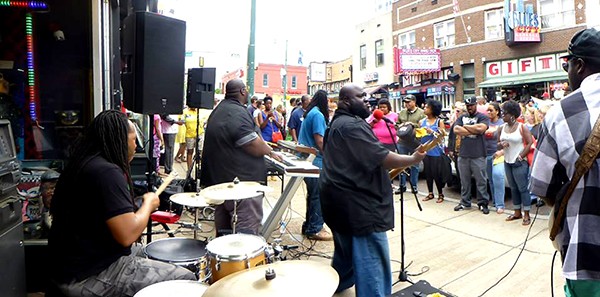Each budget season at Memphis City Hall brings a new bullseye for the Memphis & Shelby County Music Commission.
The group is an annual target for Memphis City Councilmembers Shea Flinn and Jim Strickland. Each has called for the commission to be completely cut from the city’s budget each year for the past few years. Flinn’s voice on the matter has been dampened as he resigned his council seat last week. But Strickland’s voice has been amplified in his roles as chairman of the council’s budget committee and as a front-runner candidate for the Memphis mayor’s seat.
Strickland called the music commission an example of non-essential spending during a mayoral candidate forum last week hosted by The Commercial Appeal. He’s been calling for the cut of the commission from the city’s budget at least since 2012 when he told The Memphis Flyer that a private group would better serve the commission’s mission.

Memphis & Shelby County Music Commission
Memphis Mayor A C Wharton has funded the group with $250,000 for the past few years and has the same amount included in his proposed 2016 budget that totals more than $656 million.
“The Memphis Music Commission serves an important role in supporting and furthering the city’s world-renowned music heritage,” Wharton said in a statement. “Through programs like the Musician Healthcare Plan, Memphis Music Monday, and Music Business forum, the commission is making it possible for musicians to develop their careers and showcase their music and learn about the business side of the music industry.”
Tracking the music commission’s funding is tough. In the 2015 budget, the commission is listed under “special services” in the city’s Parks and Neighborhoods budget, not in the expected “grants and agencies” section alongside budgets for the Memphis Film & Television Commission, Urban Art, the Black Business Association, and more. Budgets for the commission, Second Chance, and Community Affairs are lumped together, making it hard to determine exactly which group gets and spends what.
According to the city’s human resources department, the commission’s executive director Johnnie Walker’s salary was a little more than $92,000 in the 2015 budget. Her office assistant’s salary was nearly $37,000. The rest, it is believed, is spent on running the office, buying supplies, and making grants.
The commission is comprised of 22 commissioners appointed by the mayors of Memphis and Shelby County. It “preserves, fosters, and promotes” Memphis music “through education, networking, advocacy, and professional and industry development.” The 2015 budget claims the commission operates 15 programs, though its website lists only nine. One of them — the Memphis Trolley Unplugged series — is on hold until trolley service resumes.
Walker said music is essential to Memphis tourism, and funding the commission puts the city’s money where its mouth is.
“A city that markets itself as ‘Home of the Blues, the Birthplace of Rock-and-Roll,’ that alone says that the city should be involved in the protection of that legacy and providing resources so that legacy can continue,” Walker said.
Walker said the commission does that with legal clinics, a health-care plan for musicians without insurance, weekly radio and television broadcasts of Memphis music, a weekly Memphis music showcase at Hard Rock Cafe, and more.
Strickland said the music industry is “huge” to Memphis but the music commission does not operate efficiently or effectively. He has said the group does not quantify “what it’s doing,” and groups like The Consortium MMT [Memphis Music Town] could do better.
“Their purpose is to develop a viable music industry in Memphis and from all indications they’re doing a very good job,” Strickland said. “Who knows Memphis music more than David Porter and Al Bell [of Consortium MMT]? No one. We ought to get behind their effort, which is privately funded.”
Budget hearings began Tuesday and are scheduled to wrap up on Tuesday, May 26th.